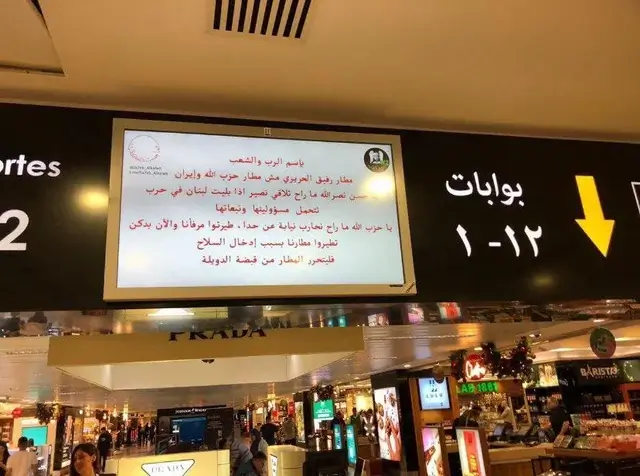
|
Getting your Trinity Audio player ready... |
As the conflict between the Israeli military and the Iran-backed Lebanese terror group continues to escalate along the border, domestic anti-Hezbollah groups broke into Beirut’s international airport’s information display screens on Sunday.
A message accusing Hezbollah of threatening an all-out war with Israel took the place of the departure and arrival information.
A message featuring logos from two obscure groups—The One Who Spoke and Soldiers of God, a hardline Christian group that has gained notoriety in the past year for its anti-LGBTQ+ campaigns in Lebanon—was shown on the screens. The Christian group denied involvement in a video statement, and the other group posted images of the screens on social media.
Reiterating criticisms made over the years by those who have accused Hezbollah of smuggling arms and ammunition through the small Mediterranean nation’s only civilian airport, the message said, “Hassan Nasrallah, you will no longer have supporters if you curse Lebanon with a war for which you will bear responsibility and consequences.”
The reports state that the message claimed the airport was “not the airport of Hezbollah and Iran.”
According to Lebanon’s National News Agency, “the BHS baggage inspection system was disrupted by the cyberattack on the airport’s departure and arrival screens.”
To “maintain normal movement at the airport,” it was stated that authorities were attempting to restore the screens.
Passengers congregated around the screens, taking pictures and posting them on social media.
Since October 8, the day after Hamas unleashed a deadly attack on southern Israel that resulted in the deaths of 1,200 people and the kidnapping of 240 others, Hezbollah has been targeting Israeli military bases and positions in the vicinity of the country’s northern border with Lebanon.
In retaliation, Israel has begun attacking Hezbollah locations and issued a warning, stating that it wishes to drive the Iranian operative away from its northern border.
After top Hamas official and commander Saleh al-Arouri was killed by an apparent Israeli strike in a southern Beirut suburb, the almost daily clashes have escalated over the past week.
US special envoy Amos Hochstein and US Secretary of State Anthony Blinken were sent to the area in an attempt to defuse tensions as the fight against Hamas raises the possibility of a wider regional conflict.
“The region is experiencing extreme tension right now. Blinken told reporters in Qatar on Sunday that there is a chance for this conflict to spread and result in even greater suffering and insecurity.
Hezbollah terror chief Hassan Nasrallah promised on Saturday that the organization would exact revenge on Arouri for the Tuesday attack in a Hezbollah stronghold in Beirut.
He rejected claims that the organization was seeking a full-scale conflict with Israel, but he did state that Hezbollah was prepared for a conflict “without limits” should Israel start one.
Following Arouri’s death, Hezbollah declared an “initial response” on Saturday and fired 62 rockets in the direction of an Israeli air surveillance base atop Mount Meron.
Fearing a regional spillover, the international community and the Lebanese government are working feverishly to keep a war in Lebanon from happening.
Josep Borrell, the head of EU foreign policy, met with a political representative of Hezbollah on Saturday in Beirut as part of an effort to keep Lebanon out of the Israel-Hamas conflict.
Hezbollah has identified 153 members whom Israel has killed in the nearly three months of cross-border fighting, primarily in Lebanon but also in Syria. A Lebanese soldier, nineteen other terror group operatives, and a minimum of nineteen civilians—three of whom were journalists—have all perished in Lebanon.
Israeli officials report that four civilians and nine soldiers have died in northern Israel.
Additionally, Syria has launched multiple strikes without resulting in any casualties.
Anti-Hezbollah messaging appears on airport screens
On Sunday, as border clashes between the Israeli military and the Lebanese militant group continue to escalate, domestic anti-Hezbollah groups broke into the information display screens at Beirut’s international airport.
A message accusing Hezbollah of threatening an all-out war with Israel took the place of the departure and arrival information.
Two messages were shown on the screens: one from a little-known group called The One Who Spoke, and the other from a hardline Christian group called Soldiers of God, which has gained notoriety in the past year for its campaigns against the LGBTQ+ community in Lebanon. On social media, the other group posted images of the screens, while the Christian group refuted any involvement in a video statement.
Reiterating criticisms made over the years by those who have accused Hezbollah of smuggling arms and ammunition through the small Mediterranean nation’s only civilian airport, the message said, “Hassan Nasrallah, you will no longer have supporters if you curse Lebanon with a war for which you will bear responsibility and consequences.”
Ever since the Hamas-Israel war in Gaza started on October 8, Hezbollah has been attacking Israeli military positions and bases close to the country’s northern border with Lebanon. As payback, Israel has been hitting Hezbollah targets.
Over the past week, the almost daily clashes have become more intense after top Hamas commander and official Saleh Arouri was killed by what appeared to be an Israeli strike in a southern Beirut suburb.
The head of Hezbollah, Sayyed Hassan Nasrallah, promised the organization would strike back in a speech on Saturday. He rejected accusations that the organization wants a full-scale conflict with Israel, but he did say that Hezbollah is prepared for a conflict “without limits” should Israel start one.
With 62 rockets fired toward an Israeli air surveillance base atop Mount Meron, Hezbollah declared an “initial response” to Arouri’s death on Saturday.
To avert a war in Lebanon, which they believe would have regional ramifications, both the international community and the Lebanese government have been working nonstop.
According to Lebanon’s state-run National News Agency, the hack momentarily interfered with baggage inspection. Passengers congregated around the screens, taking pictures and posting them on social media.
In 2006, Israel and Hezbollah engaged in a month-long battle that resulted in a draw. Israel destroyed Lebanon’s airport with bombs in the early phases of the conflict.







